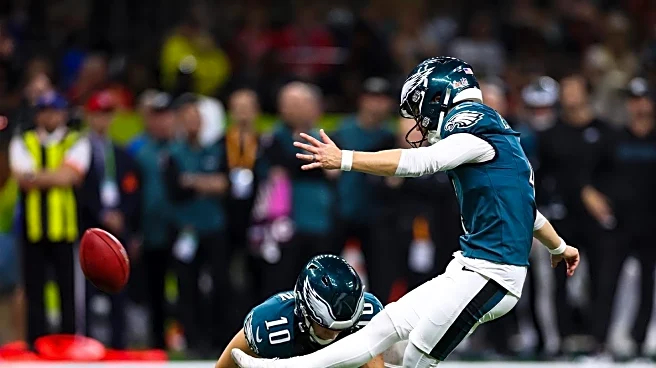What's Happening?
Colin Fleming, in a recent opinion piece, discusses the cultural phenomenon of Americans spending excessive hours watching football, particularly during the NFL season. He describes this behavior as becoming a 'football couch zombie,' where individuals spend entire days engrossed in football games, often accompanied by unhealthy eating and drinking habits. Fleming argues that this trend is symptomatic of a broader societal issue where people are increasingly sedentary and disengaged from active living. He draws parallels between the physical dangers of playing football, such as chronic traumatic encephalopathy (CTE), and the mental and physical lethargy associated with being a passive spectator. Fleming suggests that this behavior contributes to a cycle of inactivity and mental stagnation, urging readers to find balance by incorporating physical and mental activities into their routines.
Why It's Important?
The discussion raised by Fleming is significant as it touches on the broader implications of sedentary lifestyles, which are prevalent in American society. The trend of spending extensive hours watching sports can lead to health issues such as obesity, cardiovascular problems, and mental health challenges. This behavior also reflects a cultural shift towards passive entertainment, which can detract from personal development and community engagement. By highlighting these issues, Fleming encourages a reevaluation of leisure activities and promotes a more active and balanced lifestyle. This conversation is particularly relevant as public health officials and policymakers seek to address the growing concerns of lifestyle-related health problems in the U.S.
What's Next?
Fleming's commentary may prompt individuals and communities to reconsider their leisure habits, potentially leading to initiatives that encourage more active and engaged lifestyles. Sports organizations and broadcasters might also explore ways to promote healthier viewing habits, such as integrating fitness challenges or educational content during broadcasts. Additionally, public health campaigns could leverage this discussion to advocate for reduced screen time and increased physical activity, aiming to mitigate the health risks associated with sedentary behavior.
Beyond the Headlines
The cultural critique offered by Fleming also raises questions about the role of sports in society and how it shapes social norms and values. The emphasis on passive consumption of sports entertainment could be seen as a reflection of broader consumerist tendencies, where individuals are encouraged to consume rather than create or engage. This perspective invites a deeper examination of how leisure activities are marketed and consumed, and the potential for sports to be a catalyst for positive social change if approached with mindfulness and balance.










